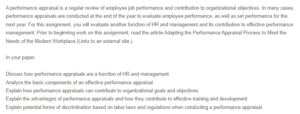Importance of Performance Appraisal in Organizations
Organizations regularly use performance appraisal to measure the level of their employees’ performance. Performance appraisal is especially important in giving employees big-picture feedback on their roles and justifying bonuses and pay increases. Organizations use this formal system to initiate strategic plans. The human resources department plays an active role in designing a performance management system to foster employees’ career development. Performance management is an optional system in firms that helps motivate employees and promote their career growth. Still, it must be implemented per labor laws because it may harbor forms of discrimination.
The design and implementation of performance appraisal are key functions of the HR department. The department has a functional role as the mediator between employees and reviewing authorities. DeNisi and Murphy (2017) explained that the HR department ensures that the performance management process is simple and designed so that employees’ ratings are in line with their overall achievement. The HR ensures that employees understand their roles in the performance management process while also participating actively in the rating process to protect the managers from accusations of unfairness and ensure employees achieve their career development. Therefore, the HR department plays a crucial role in designing and implementing a performance appraisal system and ensuring that its criteria are clear and transparent.
Key Elements of Performance Appraisal
A performance appraisal must have several important elements to be considered effective. One of these is performance planning, which forms the foundation of the performance management system (Cappelli & Conyon, 2017). Typically, the appraiser and the reviewer jointly participate in planning the performance appraisal at the beginning of a performance session, with employees allowed to decide on their key performance areas and new deadlines for accomplishing those tasks per performance budget (Cappelli & Conyon, 2017). Another crucial element of performance management is the appraisal and reviewing approach. This component comprises self-appraisal over a year in quantifiable terms. Thereafter, the appraiser provides the final quantifiable and measurable ratings while actively involving the appraiser and employees in the process to identify and address potential loopholes. Rewarding good performance is another important element of the performance appraisal system that determines employees’ motivation, eventually influencing self-esteem and achievement orientation. These components ensure that a performance appraisal is effective enough to achieve the organization’s objectives.
Relatedly, performance appraisal ensures that employees manage and meet the organization’s objectives. The appraisal system usually helps employees and supervisors identify strengths and areas of weaknesses of performance (Cappelli & Conyon, 2017). The review evaluates employees’ achievement, skills, or lack thereof for continuous effectiveness. The big-picture scenario helps organizations to initiate plans for employee development through increased roles and training. Eventually, such efforts help organizations meet their strategic objectives.
Advantages of Performance Appraisal
The advantages of an effective appraisal system are based on its ability to identify employees’ strengths and weaknesses and foster career development. One primary advantage of performance management is that it provides feedback on employees’ job performance while rewarding best-performing individuals (Cappelli & Conyon, 2017). In this way, organizations motivate employees to increase their productivity, performance, and profitability. Additionally, performance appraisal helps firms allocate a limited pool of funds to raise salaries and ward bonuses (Cappelli & Conyon, 2017). The system also allows employees to identify their areas for development. Companies use such metrics to initiate effective training and development programs. In this regard, the appraisal system tracks employees’ progress and gives feedback essential for implementing training and development initiatives.
Performance appraisal comes with several criticisms despite its many advantages. One of these advantages is that the system might exhibit discrimination in compensation and role allocation based on an individual’s religion, sex, color, or race. The Civil Rights Act of 1964 is one of the labor laws designed to ensure that employers do not discriminate against employees based on the attributes mentioned above (Burn, 2018). In addition to this, the appraisal system may discriminate against age when promoting employees. The Age Discrimination in Employment Act of 1967 protects all workers over 40 years in any aspect of employment decisions, such as promotion, demotions, and discharge (Burn, 2018). As such, employers considering implementing performance management must consider the labor laws that relate to them.
References
Burn, I. (2018). Not all laws are created equal: legal differences in state non-discrimination laws and the impact of LGBT employment protections. Journal of Labor Research, 39(4), 462-497. https://doi.org/10.1007/s12122-018-9272-0
Cappelli, P., & Conyon, M. (2017). What do performance appraisals do? ILR Review, 71(1), 88-116. https://doi.org/10.1177/0019793917698649
DeNisi, A., & Murphy, K. (2017). Performance appraisal and performance management: 100 years of progress? Journal of Applied Psychology, 102(3), 421-433. https://doi.org/10.1037/apl0000085
ORDER A PLAGIARISM-FREE PAPER HERE
We’ll write everything from scratch
Question
A performance appraisal is a regular review of employee job performance and contribution to organizational objectives. In many cases, performance appraisals are conducted at the end of the year to evaluate employee performance, as well as set performance for the next year. For this assignment, you will evaluate another function of HR and management and its contribution to effective performance management. Prior to beginning work on this assignment, read the article Adapting the Performance Appraisal Process to Meet the Needs of the Modern Workplace (Links to an external site.).

Importance of Performance Appraisal in Organizations
In your paper,
Discuss how performance appraisals are a function of HR and management.
Analyze the basic components of an effective performance appraisal.
Explain how performance appraisals can contribute to organizational goals and objectives.
Explain the advantages of performance appraisals and how they contribute to effective training and development.
Explain potential forms of discrimination based on labor laws and regulations when conducting a performance appraisal.

